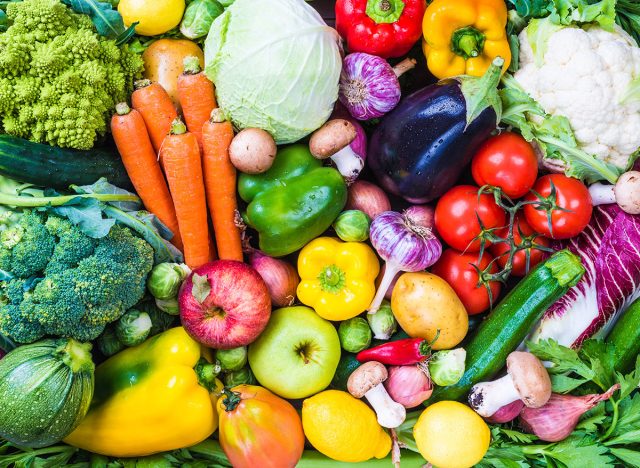These 5 Eating Habits Can Save Your Heart, Says Cardiologist

Caring for your heart has always been important. But since heart disease still continues to hold its place as the leading cause of death in the U.S., it feels like more needs to be done both on a societal level as well as individually. While there may be certain factors outside of our control—such as genetics, access to healthier food, and the ongoing COVID-19 pandemic—there are lifestyle choices that can be made on a daily basis in order to help reduce your risk of heart disease. There are even eating habits you can adopt that may save your heart.
Just yesterday, the American Heart Association released its yearly report, Heart Disease and Stroke Statistics 2023. This report dives into some of the leading factors affecting cardiovascular diseases, such as physical activity, weight, smoking, cholesterol, blood pressure, blood glucose, and diet. It also notes that the impact of COVID-19 was significant because of the way it reduced physical activity in many people. The AHA factors listed may vary across individuals, but many can be directly linked to diet and nutrition, like weight, cholesterol, glucose levels, and blood pressure levels. This drives home the importance of developing helpful eating patterns as a way to care for your heart and prevent disease.
To learn more about the habits that can save your heart, we talked with Dr. Kaustubh Dabhadkar, MD, MPH, MBA, FACC, a cardiologist who specializes in preventive cardiology. He shared five simple dietary steps we can implement in our daily routine that can help us work toward having a healthier heart and reducing our risk for heart disease.
Eat a diet rich in fruits & vegetables

A helpful place to start with your diet is asking yourself how many servings of fruit and vegetables you feel you're getting on a daily basis, because these foods add a lot of benefits to the health of your heart.
"Diets rich in fruits and vegetables can help lower the risk of heart disease by providing essential nutrients such as vitamins, minerals, and antioxidants," says Dr. Dabhadkar. "Many fruits and vegetables contain high levels of vitamins C and E, known to have antioxidant properties. Additionally, fruits and vegetables are high in potassium, which can help lower blood pressure. Although fruits contain high amounts of sugar, the fiber in the fruit slows down the rate of sugar absorption, which helps you avoid high sugar levels, especially when compared to fruit juices."
Also, a study published in the Annals of Internal Medicine found that those who ate diets higher in vegetables and fruit saw fewer biomarkers that were linked to heart disease or strain on their heart. So if you're looking to care for your heart through your diet, eating more fruit and vegetables can make an enormous impact.
Incorporate whole grains
Eating whole grains instead of refined grains when you can is a big step in caring for your heart health. The main difference between whole and refined grains is that whole grains still have all of the parts of the grain in tact, which means the fiber and nutrients are still there. Refined grains, like white pasta and white bread, are made by removing the bran and germ from the grain, and most of the fiber and beneficial nutrients along with it.
"Whole grains are an excellent source of fiber, which can help lower cholesterol levels and reduce the risk of heart disease, and they contain essential vitamins B and E, magnesium, and selenium," says Dr. Dabhadkar.
Mayo Clinic also states that whole-grains can help lower cholesterol and reduce blood pressure, both of which are directly linked to your heart health.
Limit saturated & trans fats

"Saturated and trans fats can raise LDL (bad) cholesterol levels and increase the risk of heart disease," says Dr. Dabhadkar. "By limiting the intake of saturated fats found in meat and dairy products, and avoiding trans fats found in processed foods, you can help lower your cholesterol levels and reduce your risk of heart disease."
It's far too difficult for most of us to completely eliminate these fats from our diet. If you're looking for some guidance on how much saturated fat you can aim to eat for a healthy heart, the American Heart Association says to stick to no more than 5-6% of your daily calories from saturated fat. For a 2,000 calorie diet, this is around 120 calories.
Eat fish twice a week
"Fish such as salmon, tuna, and sardines are high in omega-3 fatty acids, which can help reduce the risk of heart disease by helping to lower triglycerides, reduce inflammation, and lower blood pressure," says Dr. Dabhadkar. "Eating fish twice a week can help you meet the recommended intake of these essential fatty acids."
There's good news for seafood haters or those with an allergy, too. If you can't meet the recommend amount of fish per week, you can always try taking omega-3 supplements in pill form. However, make sure you discuss this with your doctor before adding a new supplement to your routine.
Consume your meals early

The last eating habit to save your heart, and one that can be applied to any dinner meal regardless of what's in it, is to eat your last meal of the day at an early hour. This can help you manage your weight, which will in turn help you care for your heart health.
"A recent study concluded that eating meals earlier helped to avoid weight gain," says Dr. Dabhadkar. "When you eat an early dinner, it allows the body to use the excess glucose instead of storing it as fat." Also, eating later in the evening can slow metabolism and increase your hunger, according to the study.
Managing your weight can be an important factor in reducing your risk of heart disease. According to JAMA Cardiology, obesity is linked to a few heart complications, such as coronary artery disease, atrial fibrillation, and heart failure. This doesn't mean that being overweight is going to lead to heart disease, but if you're already at risk, it may be helpful to talk with a trusted doctor or dietitian about some healthy, sustainable steps you can take. In fact, all of the tips mentioned above are helpful in having a plan of where to start, but ultimately, talking to a medical professional about your heart health and concerns is the best next step you can take.
- Source: https://www.cdc.gov/heartdisease/facts.htm#:~:text=Heart%20disease%20is%20the%20leading,groups%20in%20the%20United%20States.&text=One%20person%20dies%20every%2034,United%20States%20from%20cardiovascular%20disease.&text=About%20697%2C000%20people%20in%20the,1%20in%20every%205%20deaths.
- Source: https://www.ahajournals.org/doi/10.1161/CIR.0000000000001123
- Source: https://www.acpjournals.org/doi/10.7326/M20-0336
- Source: https://www.mayoclinic.org/healthy-lifestyle/nutrition-and-healthy-eating/in-depth/whole-grains/art-20047826
- Source: https://www.heart.org/en/healthy-living/healthy-eating/eat-smart/fats/saturated-fats
- Source: https://www.cell.com/cell-metabolism/pdfExtended/S1550-4131(22)00397-7
- Source: https://jamanetwork.com/journals/jama/fullarticle/1779537









